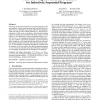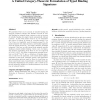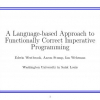122
Voted
ICFP
2005
ACM
15 years 8 months ago
2005
ACM
Narrowing-driven partial evaluation is a powerful technique for the specialization of (first-order) functional and functional logic programs. However, although it gives good resu...
119
click to vote
ICFP
2005
ACM
16 years 2 months ago
2005
ACM
High-level formalisms for reasoning about names and binding such uijn indices, various flavors of higher-order abstract syntax, ry of Contexts, and nominal abstract syntax address...
119
Voted
ICFP
2005
ACM
16 years 2 months ago
2005
ACM
146
click to vote
ICFP
2005
ACM
16 years 2 months ago
2005
ACM
We study the relation between Nominal Logic and the Theory of Contexts, two approaches for specifying and reasoning about datatypes with binders. We consider a natural-deduction s...
140
click to vote
ICFP
2005
ACM
16 years 2 months ago
2005
ACM
We present a parametric Hoare-like logic for computer-aided reasoning about typeable properties of functional programs. The logic is based on the concept of a specialised assertio...
105
Voted
ICFP
2005
ACM
16 years 2 months ago
2005
ACM
We generalise Fiore et al's account of variable binding for untyped cartesian contexts and Tanaka's account of variable binding for untyped linear contexts to give an ac...
100
Voted
ICFP
2005
ACM
16 years 2 months ago
2005
ACM
139
Voted
ICFP
2005
ACM
16 years 2 months ago
2005
ACM
We present a foundation for a computational meta-theory of languages with bindings implemented in a computer-aided formal reasoning environment. Our theory provides the ability to...
116
Voted
ICFP
2005
ACM
16 years 2 months ago
2005
ACM



